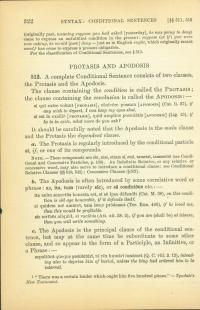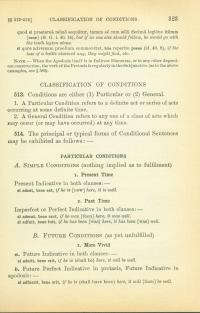512. A complete conditional sentence consists of two clauses the protasis and the apodosis. The clause containing the condition is called the PROTASIS the clause containing the conclusion is called the APODOSIS.
sī quī exīre volunt [PROTASIS], cōnīvēre possum [APODOSIS] (Cat. 2.27)
If any wish to depart, I can keep my eyes shut.
Sī est in exsiliō [PROTASIS], quid amplius postulātis? [APODOSIS] (Lig. 13)
If he is in exile, what more do you ask?
It should be carefully noted that the apodosis is the main clause and the Protasis the dependent clause.
a. The protasis is regularly introduced by the conditional particle sī (if), or one of its compounds.
Note— These compounds are sīn, nisi, etiam sī, etsī, tametsī, tamenetsī (see Conditional and Concessive Particles, § 224). An indefinite relative, or any relative or concessive word, may also serve to introduce a conditional clause: see Conditional Relative Clauses (§ 519, § 542); Concessive Clauses (§ 527).
b. The apodosis is often introduced by some correlative word or phrase: as, ita, tum (rarely sīc), or eā condiciōne etc.
Ita enim senectūs honesta est, sī sē ipsa dēfendit. (Cat. M. 38)
On this condition is old age honorable, if it defends itself.
Sī quidem mē amāret, tum istuc prōdesset. (Ter. Eun. 446)
If he loved me, then this would be profitable.
sīc scrībēs aliquid, sī vacābis (Att. 12.38.2)
If you are (shall be) at leisure, then you will write something.
c. The apodosis is the principal clause of the conditional sentence, but may at the same time be subordinate to some other clause, and so appear in the form of a participle, an infinitive, or a phrase.
sepultūrā quoque prohibitūrī, nī rēx humārī iussisset (Q. C. 8.2.12)
intending also to deprive him of burial, unless the king had ordered him to be interred
Quod sī praetereā nēmō sequātur, tamen sē cum sōlā decimā legiōne itūrum. [esse] (B. G. 1.40.14)
But if no one else should follow, he would go with the tenth legion alone.
sī quōs adversum proelium commovēret, hōs reperīre posse (id. 40.8)
If the loss of a battle alarmed any, they might find , etc.
Note— When the apodosis itself is in indirect discourse, or in any other dependent construction, the verb of the protasis is regularly in the subjunctive (as in the above examples, see § 589).


